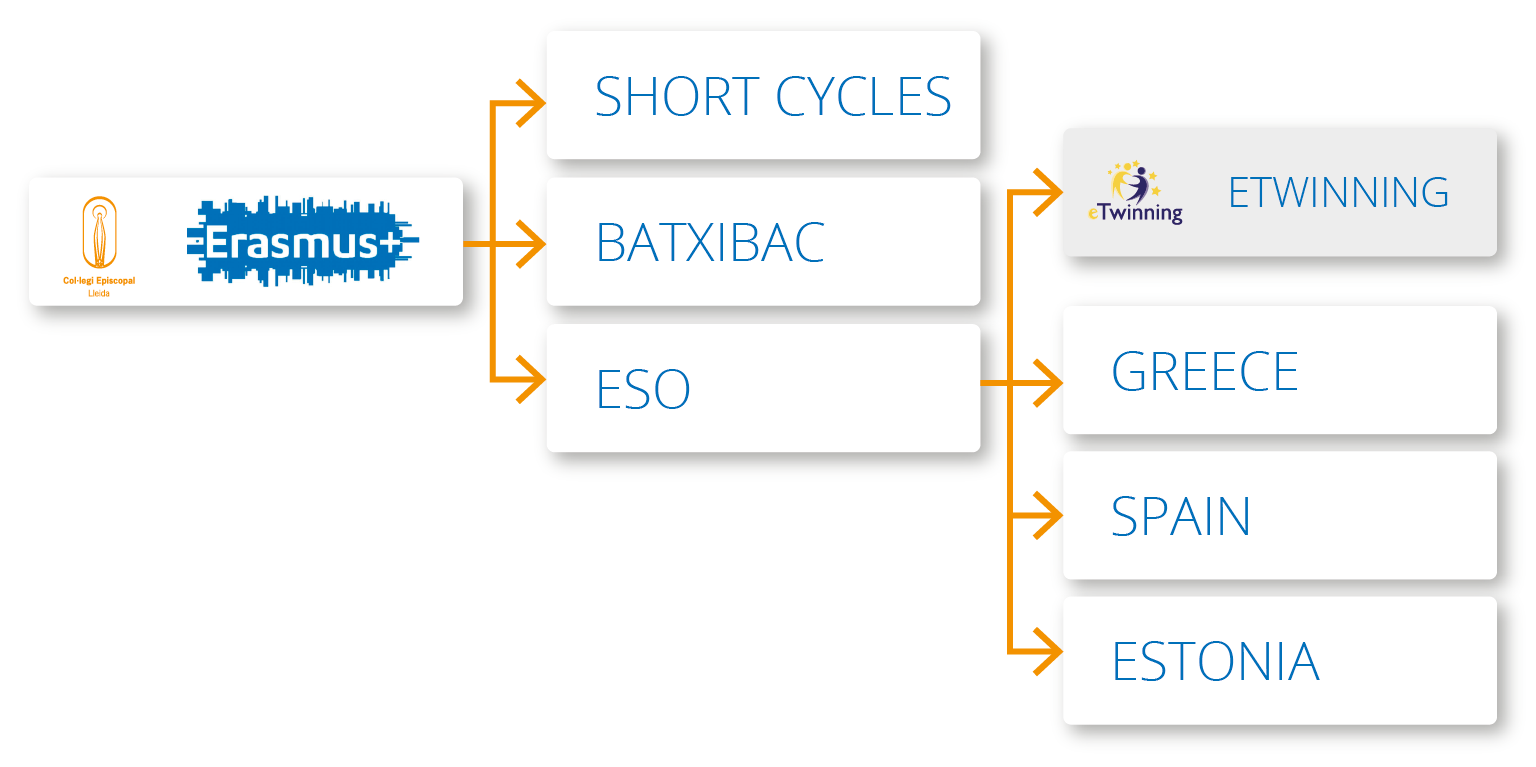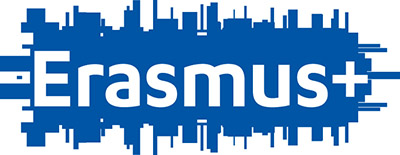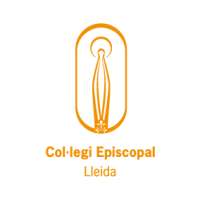

Erasmus+ és un programa de la UE que té per objectiu millorar les possibilitats que tenen els joves de trobar feina i permetre’ls-hi alhora desenvolupar la seva personalitat
QUÈ ÉS ERASMUS+
Erasmus+ és un programa de la UE que té per objectiu millorar les possibilitats que tenen els joves de trobar feina i permetre’ls-hi alhora desenvolupar la seva personalitat; també pretén ajudar els nostres sistemes d’ensenyament i de formació professional a oferir un ensenyament que proporcioni als joves les competències necessàries per poder-se incorporar a la societat i al mercat de treball d’avui dia i del futur.
Que estudiants d’ensenyament superior i formació professional estudiïn, es formin o tinguin una experiència laboral a l’estranger i que els d’ensenyament superior ho puguin fer tant dins com fora d’Europa, beneficiant-se lingüística i culturalment.
Que el personal docent, els professors de formació professional, el personal administratiu i els animadors juvenils puguin impartir classes i formacions, compartir experiències i ampliar a l’estranger les seves perspectives professionals i, en el cas dels estudiants d’ensenyament superior, que ho puguin fer tant dins com fora d’Europa.
Facilitar el reconeixement acadèmic de les estades a l’estranger a través del sistema ECVET com a eina que garanteix la qualitat de les accions de mobilitat i la seva transparència.
ERASMUS POLICY STATEMENT (EPS)
Episcopal School, Mare de Déu de l’Acadèmia is a catholic school of 1,500 students distributed among the different levels of kindergarten, Primary and Secondary Education, High School and 5 Vocational training cycles -Higher Technician in Administration and Finance; Higher Technician in Pre-Primary Education; Higher Technician in Social Integration; Higher Technician in socio sportive animation and Higher Technician in Fitness.
The OBJECTIVES of the institution to take part in Erasmus+ actions are the following:
- Promote international mobility of students and staff.
- Enhance our students ‘employability.
- Improve foreign languages knowledge.
- Encourage entrepreneurship, creativity, and innovation.
- Foster environmentally friendly, sustainable, and conscious lifestyles.
- Contribute to build a sense of European identity.
- Find out and develop new professional methodologies and digital abilities.
Our Higher Education Institution would like to be engaged in KA1 actions carrying out international mobilities for higher education students (traineeship) and staff and in a near future, cooperation projects (KA2) with other HEIs. Around 250 students are enrolled in these courses and approximately 20 staff members are involved, so we expect the project has a great impact on the institution and the city.
Erasmus+ actions will allow us to obtain the following RESULTS:
- Improve the academic level of participants.
- Create a team conscience among the different members of the staff, departments, implementing good, innovative practices learnt -including the technological ones-.
- Give equal opportunities to applicants to participate in the programme.
Acquire a feeling of European cultural awareness. - Spread the impact of the project to the educative community and the city through the school website and social media.
The outputs will consist of website and social media news, evaluation reports, course guides.
STRATEGY
The aim of Episcopal’s Higher Education Institution strategy is to develop European partnerships obtaining funding from the Erasmus+ Programme to ensure that Short Cycle students (Upper VET) can carry out their Higher Technician Diploma through traineeships (KA1) in European companies to foster their employability and create direct bridges from Higher institutions and labour market. The institution is aware of the possibilities Erasmus+ can provide the students and staff so as to improve their vocational training quality, their linguistic, professional and cultural competences. Also, the school is aware of the importance of the respect for the linguistic diversity and the strong desire to learn other languages. It is part of our mission to make individuals develop a genuine intercultural education that understands diversity as an element of mutual enrichment which recognises the equality and dignity of citizens. By taking all these aspects into consideration, the school board will promote the following general strategies:
- The modernisation and professionalization of the institution through connections with European companies and other Higher Education institutions.
- The High Education Institute students’ employability.
Acquisition of digital skills and development of pedagogies based on Information and Communication Technologies (ICT) - Future KA2 cooperation projects among European organisations.
- A conscience of environmentally friendly sustainable lifestyle among the educative community.
In our effort to build a European Education Area through our participation in the program the institution focuses on the following specific STRATEGIES:
- Open professional possibilities to students by carrying out the traineeship in European enterprises.
- Improve students and staff’s abilities to foster the cultural, social, and linguistic diversity.
- Foster interculturality, the search for opportunities, and European awareness.
- Adopt inclusion measures for people with diversity and from disadvantaged backgrounds to foster equality among all the participants.
- Create environmentally friendly, sustainable, and conscious lifestyles within our school.
OBJECTIVES
The institution aims to reach the following objectives:
- Promote international mobility of students -by carrying out the traineeship in an EU country- and staff by sharing experiences from the partnership- and regardless of their social, economic, and cultural background.
- Promote the entrepreneurial spirit of the students to become autonomous citizens capable of facing and solving situations in life and to create jobs in demand on the labour market.
- Improve foreign languages knowledge of students and staff by offering courses in the institution before the mobility and learning in the host country.
- Encourage entrepreneurship, creativity, and innovation from learning through the diverse way of working in the different firms or institutions that will allow enriching oneself and the institution.
- Foster environmentally friendly, sustainable, and conscious lifestyles by using less-carbon impact transport when possible, recycling paper and plastic and avoiding the use of bureaucratic paper- documents.
- Contribute to build a sense of European identity promoting the knowledge of other countries and their cultures; focusing on the ability to adapt oneself to a new culture, language, and work conditions as well as promoting tolerance, respect and increasing social participation for an active citizenship.
- Find out and develop new professional methodologies by the acquisition of digital abilities becoming an integrated part of the students and staff’s personal knowledge.
IMPACT
The IMPACT the institution wants to achieve with Erasmus+ actions are:
1. Academic improvement: The program fosters the willing to improve the students’ academic skills as obtaining good results is one of the basic objectives in the selection of candidates. Also, the improvement of the foreign language, learnt before and during the mobility.
2. Modernisation of our educational system: Our commitment with internationalisation focuses on the modernisation of our educational system which will bring and consolidate students to our institution, help staff update their methodologies by sharing best practises which will help participants to enrich with learning and new experiences.
3. Department and staff cooperation: The implementation of the program will contribute to working in cooperation among different members of the institution: Erasmus+ team, Foreign Language Department, Short Cycle direction and teachers, benefitting participants. Also, it will help create team conscience for future projects.
4. Acquisition of innovative practices that will allow learning new work environments, and different work methodologies contributing to create competent and skilled citizens.
5. Development of ICTs: During the period of mobility of students, they need to develop skills in new technologies and understand different virtual environments, conducting interviews with host companies using "Teams” type platforms, such as finding accommodation, different routes until they reach the destination country.
6. Giving access to the programme to people with fewer opportunities: By means of Erasmus Programme economic aid, the institution will be able to offer the access to internationalisation to students of our institution who would not be able to reach without it, so this will contribute to reinforce the quality and learning of all the students.
7. Increasing the number of families interested in our institution. By gradually implementing Erasmus Programme we are aware of the benefits our institution can acquire, boosting quality in education, providing participants and staff with skills and competences that cannot be gained otherwise, consolidating networks, and bringing more students to our institution.
8. European conscience. The small city of Lleida will benefit from the mobility of the students of our institution who will have a more European vision after the experience. The mobility action will be disseminated through the mass media, newspaper, local TV, school website and social media, so it will have a significant impact on the citizens.
INDICATORS
To Measure these impacts in a quantity and qualitatively way, our institution will collect data before, during and after mobilities and actions, carried out in within Erasmus +. (In brackets, the number expected to reach for each indicator)
BEFORE MOBILITY
- Number of families informed about the new Erasmus+ programme. (1,500 families of the students enrolled in the institution).
- Number of staff informed about the new Erasmus+ programme. (180 members)
- Record of expected applicants of Short Cycles. (25) *
- Number of selected applicants of Short Cycles (15) *
- Record of expected staff that apply for mobility. (5) *
- Number of selected staff. (2) *
- *These data are expected indicators for the first year, but we expect they increase in the following years.
DURING MOBILITY
- Outcomes of the foreign language improvement. OLS test assessment: initial and final test allow both students and institutions to monitor improvements in foreign languages skills.
- Monitoring questionnaires to assess the participants learning progress.
AFTER MOBILITY
- Final report to assess if the learning outcomes included in the learning agreement of each participant have been achieved.
- Satisfaction questionnaires of the strength and weak points of our project through participants’ feedback.
- Increasing number of students involved in Erasmus+ projects. (20)
- Increasing number of staff involved in Erasmus+ projects. (3)
- Increasing number of people that enrol in our institution because of Erasmus+ grants.
- Increasing number of people interested in Erasmus+ projects.
- Number of news uploaded in the school website and social media (6) (before, during and after mobility)
